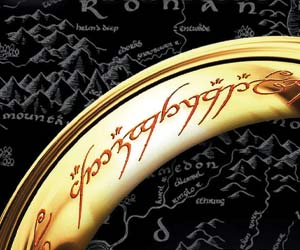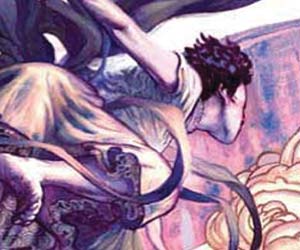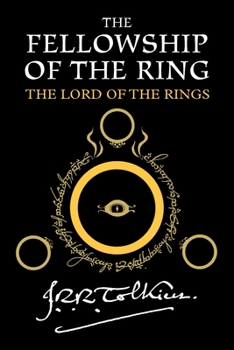The Fellowship of the Ring: Being the First Part of the Lord of the Rings
(Book #1 in the The Lord of the Rings Series)
Select Format
Select Condition 
Book Overview
The Fellowship of the Ring is the first volume in J.R.R. Tolkien's epic adventure tale, The Lord of the Rings.
One Ring to rule them all, One Ring to find them, One Ring to bring them all and in the darkness bind them.
In ancient times the Rings of Power were crafted by the Elven-smiths, and Sauron, the Dark Lord, forged the One Ring, filling it with his own power so that he could rule all others. But the One Ring was taken from him, and though he sought it throughout Middle-earth, it remained lost to him. After many ages it fell into the hands of Bilbo Baggins, as told in The Hobbit. In a sleepy village in the Shire, young Frodo Baggins finds himself faced with an immense task, as his elderly cousin Bilbo entrusts the Ring to his care. Frodo must leave his home and make a perilous journey across Middle-earth to the Cracks of Doom, there to destroy the Ring and foil the Dark Lord in his evil purpose.
"A unique, wholly realized other world, evoked from deep in the well of Time, massively detailed, absorbingly entertaining, profound in meaning."--The New York Times
Customer Reviews
Book was DESTROYED upon receiving the order “in very good condition”.
Not in good condition
Great! Very excited!
Vintage Cover
Best book ever
Una genialidad de Tolkien
Great book; Spanish translation a little clunky at times
Critica
Finally a "real" unabridged recording of LOTR
The Fellowship of the Ring Mentions in Our Blog

Cassandra Clare's celebrated YA Shadowhunter Chronicles have generated a devoted fan base. Her newest book, Chain of Thorns, comes out on Jan. 31 and we're offering a free book credit to customers who preorder their copy before the release date. Read on to learn more about the author and get in on the deal.

We've been nerding out about Amazon's upcoming Lord of the Rings series premiering on September 22. So, we're reading everything we can about the history of these epic stories and we've learned some pretty interesting things. Here are ten little-known facts we've uncovered.


In celebration of National Children's Book Week, Thriftbooks enlisted OnePoll to survey 2,000 Americans about what they remember from their favorite childhood volumes. And what we learned turned into a pretty sweet story.

For April Fool's Day, we're exploring the role of fools in literature. Shakespeare is sometimes credited with establishing the fool as instrumental in his plots. Though they serve as subjects of amusement, and even ridicule, they often emerge as the ones who see the world most clearly.







